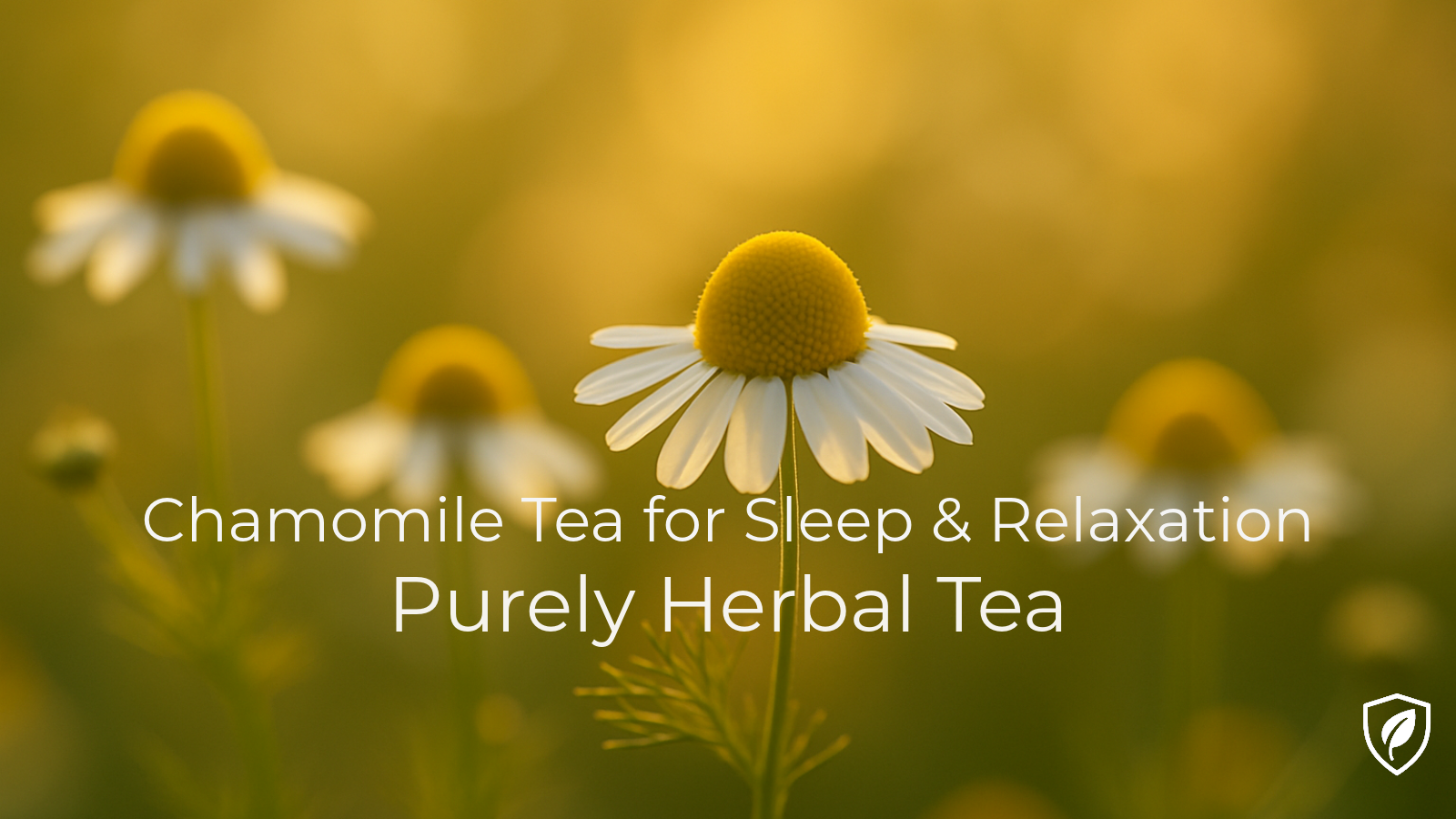In the quiet of evening, a simple cup can become a small act of care. Chamomile invites the body to soften and the mind to settle—one calm sip at a time.
Why Chamomile Is a Classic Bedtime Tea
This piece is part of our seasonal ritual series. If you’d like the full picture, start with Fall Rituals with Herbal Tea to Bring Calm to Your Season, where we explore how autumn blends can ground your days and evenings.
For centuries, chamomile has been used as a gentle night companion. Its soft, apple-like aroma and naturally caffeine-free profile make it an easy ritual to adopt at the end of the day. While coffee asks us to speed up, chamomile invites us to slow down—an intentional shift from doing to being. In a world that rewards urgency, this humble flower offers the opposite: warmth, softness, and space to breathe.
Part of chamomile’s appeal is how it blends flavor, comfort, and function. When you steep whole blossoms in hot water, their essential oils release quietly, creating a cup that’s soothing without being heavy. It’s the kind of comfort that doesn’t demand attention—just presence.
How Chamomile Supports Better Sleep
Sleep isn’t a switch—it’s a rhythm. Chamomile helps set that rhythm by supporting the body’s natural wind-down process. The plant contains compounds (including apigenin) that are widely associated with calm and restfulness. The experience is gentle: a softening around the edges, a little less tension in the shoulders, a quieter pace in the mind. Over time, repeating the same evening steps—kettle on, mug warmed, three to five minutes of steeping—signals to your body that it’s safe to let go.
If you currently rely on afternoon caffeine, consider pairing chamomile with changes earlier in the day. Reducing late-day stimulants and introducing a calming herbal at night creates a balanced cycle—alert mornings, unhurried evenings. For more context on energy without over-stimulation, you may find this comparison helpful: Tea vs. Coffee: Which Boosts Energy Without the Crash?
Chamomile for Relaxation & Everyday Stress
Stress doesn’t always arrive loudly; sometimes it’s a low, constant hum. A chamomile ritual helps turn the volume down. The act of brewing becomes part of the benefit: measuring the flowers, watching steam rise, holding a warm cup with two hands. These small choices anchor attention in the present moment. Physiologically, choosing a naturally caffeine-free tea in the evening reduces stimulation and creates more favorable conditions for rest.
If you’re exploring nighttime options, you might also enjoy this earlier guide that compares two beloved bedtime herbs: Chamomile vs Lavender Tea: Which Helps You Sleep Better? It offers a simple framework to decide which flower best matches your preferred flavor and relaxation profile.
Steeping Guide: A Calm Cup, Made Simply
- Measure: 1–2 teaspoons of loose chamomile blossoms per 8 oz (240 ml) of water.
- Water: Just off the boil (~200°F / 93°C).
- Steep: 3–5 minutes for a light, floral cup; up to 7 minutes for a fuller, apple-honey profile.
- Enhance (optional): A touch of raw honey or a slice of lemon. Keep it simple—let the flower lead.
Tip: Warm your mug first with a little hot water, then discard before pouring your tea. This small step keeps the cup cozy and the flavor round.
Make Chamomile Part of Your Evening Ritual
Rituals work when they’re repeatable and kind. Choose a steady window each night, dim the lights, and brew without your phone nearby. While the tea steeps, take three slow breaths. Notice the scent. Notice the warmth in your hands. Sip without hurry. This is where chamomile does its best work—paired with stillness, not perfection.
If you’re curating a full evening routine, explore our calm-forward blends crafted for night: Evening Ritual Collection. You’ll find floral, citrus, and spice-leaning profiles that complement chamomile and round out your wind-down hour.
Common Questions
When should I drink chamomile for sleep?
Begin 45–60 minutes before bed. Give yourself time to brew, sip slowly, and let your body ease into rest.
Can I combine chamomile with other herbs?
Yes—gentle pairings like lavender, lemon balm, or a touch of spearmint can enhance relaxation and flavor without adding caffeine.
Will chamomile make me groggy in the morning?
Chamomile is calming, not sedating. Most people experience easier wind-down at night and wake clear, not sluggish.


